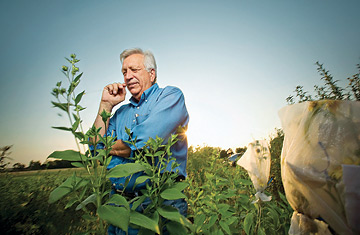
Wes Jackson, the founder of the Kansas-based Land Institute and a pioneer in sustainable agriculture, at the research farm.
Wes Jackson believes humanity took a wrong turn 10,000 years ago. That was about when modern Homo sapiens first plowed the wild land, beginning the shift from hunting and gathering to farming. Agriculture made possible the growth of human civilization, but according to Jackson, 71, a geneticist by training, the practice of farming is ruining the land.
Tearing out the wild perennial (year-round) plants that had evolved over hundreds of millions of years, humans bred specialized, high-yield cereal crops like wheat and sorghum that delivered calories but eroded the soil. The damage has worsened over the past half-century, as the population exploded and agriculture kept pace only with intensified use of chemical fertilizers and irrigation. Today 38% of global farmland is considered degraded. "We're spending down the capital stock of the earth," says Jackson in his Kansas drawl.
But Jackson thinks he has the answer: remake agriculture so it mimics nature. At the Land Institute in Salina, Kans., a farming-research center he founded in 1976, he is pioneering efforts to develop crops that would combine the sustainability of inedible perennials like wheatgrass, which use water efficiently and naturally conserve the soil, with the bountiful yield of cereal plants like barley.
The work is slow going, requiring scientists to select traits in each generation of plants so that they become increasingly tasty and edible while retaining their easy-on-the-earth qualities. Jackson estimates it might take 50 years to domesticate perennials, but his team is also trying to shortcut evolution by crossing perennials with cereal crops to produce a hybrid that might have the best of both worlds. There haven't been any sudden breakthroughs yet, but the Kansas group is working for tomorrow. "The agriculture we're talking about will save the soil for future people," he says. If he's right, we might earn another 10,000 years.